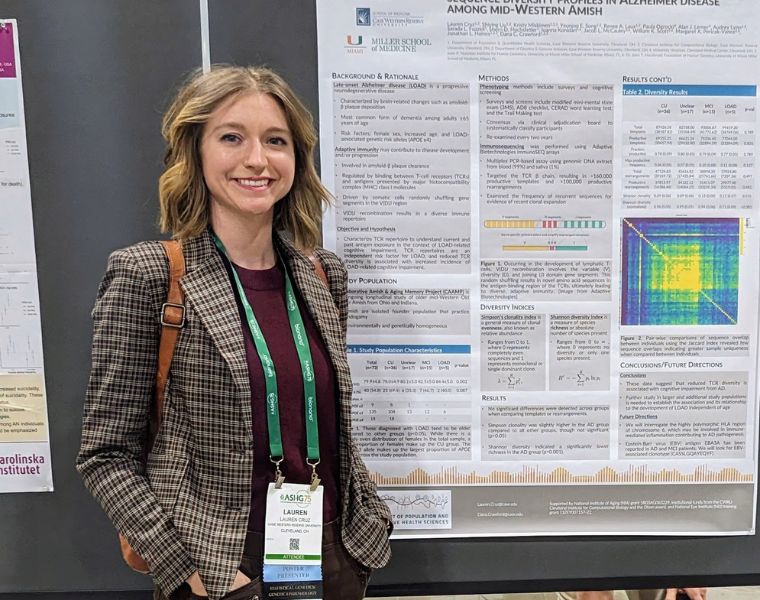Complex chronic diseases are indeed, in a word, complex. With few diverse datasets from which to pull, it’s impossible to fully understand their underlying physiology—a fact that leads Lauren Cruz to call these diseases the “health conundrums of our generation.”
The mystique of complex chronic diseases is worsened by the fact that most research is conducted on white men of similar backgrounds—meaning there is much we don’t know about how diseases impact other populations.
“We can and must do better,” said Cruz, a fourth-year PhD candidate in the Department of Epidemiology and Biostatistics at Case Western Reserve University School of Medicine.
And Cruz is committed to remedying this problem.
“I cannot think of a more meaningful effort to dedicate my time and attention to than advancing ethical scientific research toward equitable healthcare for all,” she said.
She’s working toward that mission after being selected to participate in the 2024 National Institutes of Health All of Us Research Scholar Program. Through her work in this program, she will be part of a larger effort to diversify health research databases so investigators can advance their understandings of how diseases impact different groups.
During the eight-week opportunity, Cruz is working with a mentor to conduct original research on the association between glaucoma and genetic ancestry using genotype, survey and electronic health record data. All participants in the program complete training on racial equity consciousness and inclusion.
At the conclusion of the program, Cruz hopes to identify novel associations between glaucoma and ancestral haplotypes.
And she hopes to pay it forward. Once she’s eligible, Cruz hopes to serve as a mentor to young researchers seeking to make research data more equitable through the All of Us program.
1. What drew you to CWRU?
CWRU is an R01 research institution with a great reputation for producing high-achieving scientists. The team of public health and epidemiology mentors at CWRU has an excellent track record of promoting interdisciplinary collaboration. Also, I want to be part of an organization whose mission is to leverage education to improve lives.
2. What inspired you to study epidemiology and biostatistics?
Learning the methods behind study design and data analysis gives me the perspective and technical skill to be able to contribute to bridging that gap in our understanding [of chronic diseases]. I chose to pursue this category of maladies because I believe (perhaps optimistically) that, in my lifetime, the culmination of recent and emerging biomedical breakthrough discoveries will produce massive changes in our comprehension and managing of complex chronic diseases.
Additionally, the healthcare system in the United States has some serious deficiencies. Embarrassingly, despite spending more money on healthcare than any other country, we fall short in several healthcare metrics, including earlier mortality and more multimorbidity than many other countries. We are the only high income country without universal healthcare.
3. Why did you decide to pursue a PhD?
Earning my PhD is providing me with the knowledge and confidence to pursue my own research interests as an independent scientist. I hope to become a principal investigator of my own research team and to mentor future generations of scientists. With that comes the responsibility of ethical scientific practices, community inclusion and research dissemination, all of which are emphasized in our PhD training.
4. What do you hope to do after you complete your program?
Immediately after graduation, I plan to complete a postdoctoral fellowship to supplement my academic training with additional relevant professional skills like grant application, public speaking and student mentoring. My long-term goal is to contribute meaningfully to complex chronic disease research by leveraging the skills I have acquired during my training to bring more equitable healthcare to all.
5. Can you describe your research topic?
My dissertation investigates the role of (epi)genetics on glaucoma in Hispanics and African Americans. I am using ancestrally diverse data, which allows me to characterize the role of genetic ancestry in disease development. I am also quantifying the association between epigenetic age and glaucoma.
This research is timely (read:overdue!) in that it prioritizes historically underrepresented populations. This is important because these populations continue to bear the largest disease burden for several morbidities, including glaucoma. More research centering non-white populations in glaucoma is desperately needed.
6. What do you hope comes from your research?
I hope this work contributes meaningfully to our understanding of glaucoma etiology and progression. I hope that as a result of glaucoma research in general the incidence and prevalence rates fall in the coming years; currently, rates of glaucoma are increasing, especially for Hispanic men. Ultimately, I hope many fewer people lose vision due to glaucoma .
7. Why did you decide to pursue that line of research?
Pursuing this project allows me to combine my passion for championing equitable healthcare and my interest in genetic epidemiology of complex chronic diseases. As an added bonus, working in this line of research has allowed me to collaborate with some amazing and knowledgeable scientists! (shout out to my co-mentors, Drs. Jessica Cooke Bailey and Dana Crawford) I feel lucky to be in this program. I have gained lifelong professional and personal connections throughout my time here.

